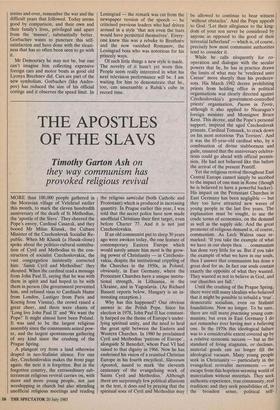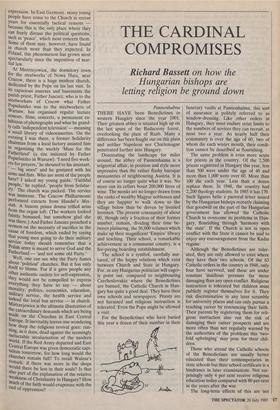THE APOSTLES OF THE SLAVS
Timothy Garton Ash on
they way communism has provoked religious revival
MORE than 100,000 people gathered in the Moravian village of Velehrad earlier this month, to mark the eleven hundredth anniversary of the death of St Methodius, the 'apostle of the Slays'. They cheered the Pope's envoy, Cardinal Casaroli, and they booed Mr Milan Klusak, the Culture Minister of the Czechoslovak Socialist Re- public. When Mr Klusak (a Husak-clone) spoke about the politico-cultural contribu- tion of Cyril and Methodius to the con- struction of socialist Czechoslovakia, the vast congregation insistently corrected him: 'Saints Cyril and Methodius!' they shouted. When the cardinal read a message from John Paul II, saying that he was with them in spirit and had hoped to be with them in person (the government prevented him, and refused visas to Cardinals Hume from London, Lustiger from Paris and Koenig from Vienna), the crowd raised a great cheer, and there were chants of 'Long live John Paul II' and 'We want the Pope!' It might almost have been Poland. It was said to be the largest religious assembly since the communists seized pow- er, and the largest spontaneous gathering of any kind since the crushing of the Prague Spring.
A plangent cry from a land otherwise draped in neo-Stalinist silence. For one day, Czechoslovakia makes the front page again; the next it is forgotten. But in the forgotten country, the extraordinary sub- terranean religious revival carries on, with more and more young people, not just worshipping in church but also attending unofficial religious meetings and reading the religous samizdat (both Catholic and Protestant) which is produced in increasing quantity. In Prague earlier this year, I was told that the secret police have now made unofficial Christians their first target, even before Charter 77. And it is not just Czechoslovakia.
If an old communist put to sleep 30 years ago were awoken today, the one feature of contemporary Eastern Europe which would surely amaze him most is the grow- ing power of Christianity — in Czechoslo- vakia, despite the institutional crippling of the Churches in the 1950s, in Poland, obviously, in East Germany, where the Protestant Churches have a unique institu- tional strength, in Lithuania, in the Ukraine, and in Yugoslavia. (As Richard Bassett reports below, Hungary is an in- teresting exception.) Why has this happened? One obvious answer is: the Polish Pope. Since his election in 1978, John Paul II has constant- ly harped on the theme of Europe's under- lying spiritual unity, and the need to heal the great split between the Eastern and Western Churches. In 1980 he proclaimed Cyril and Methodius 'patrons of Europe', alongside St Benedict, whom Paul VI had raised to that dignity in 1966. Now he has enshrined his vision of a reunited Christian Europe in his fourth encyclical, Slavorum Apostoli, issued to mark 'the eleventh centenary of the evangelising work of Saints Cyril and Methodius.' Although there are surprisingly few political allusions in the text, it does end by praying that the spiritual sons of Cyril and Methodius may be allowed to continue to bear witness 'without obstacles'. And the Pope appeals to God: 'Let their allegiance to the king- dom of your son never be considered by anyone as opposed to the good of their terrestial fatherland' — which is, of course, precisely how most communist authorities tend to consider it.
While he calls eloquently for co- operation and dialogue with the secular powers that be, he has in practice drawn the limits of what may be 'rendered unto Caesar' more sharply than his predeces- sors. His March 1982 decree prohibiting priests from holding office in political organisations was clearly directed against Czechoslovakia's government-controlled priests' organisation, Pacem in Terris, although it also applied to Nicaragua's foreign minister and Monsignor Bruce Kent. This decree, and the Pope's personal support, inspired the aged Czechoslovak primate, Cardinal Tomasek, to crack down on his most notorious 'Pax Terriers'. And it was the 85-year-old cardinal who, by a combination of divine stubborness and guile, ensured that the anniversary celebra- tions could go ahead with official permis- sion. He had not behaved like this before the arrival of the present Pontiff.
Yet the religious revival throughout East Central Europe cannot simply be ascribed to the impact of one man in Rome (though he is believed to have a powerful backer). His impact on the Protestant Churches in East Germany has been negligible — but they too have attracted new waves of young people in the last five years. The explanation must be sought, to use the crude terms of economics, on the demand as well as the supply side. And the great promoter of religious demand is, of course, communism. As Lech Walesa once re- marked: 'If you take the example of what we have in our shops then. . . communism has done very little for us. But if you take the example of what we have in our souls, then I answer that communism has done a great deal for us. In fact our souls contain exactly the opposite of what they wanted. They wanted us not to believe in God, and our churches are full.'
Until the crushing of the Prague Spring, there were still many idealists who believed that it might be possible to rebuild a 'true', democratic socialism, even on Stalinist foundations. Now no longer. To be sure, there are still many practising young com- munists; but even in East Germany I do not remember ever having met a believing one. In the 1970s this ideological failure was to a considerable extent covered up by a relative economic success — but as the standard of living stagnates, or declines, material goods can no longer fill the ideological vacuum. Many young people seek in Christianity — particularly in the evangelical revivalist movements — an escape from this hopeless-seeming world of materialism without materials. They seek authentic experience, true community, real tradition; and they seek possibilities of, in the broadest sense, political self-
expression. In East Germany, many young people have come to the Church in recent years for essentially tactical reasons because this is the only place where they can freely discuss the political questions, such as 'peace', which most concern them. Some of them may, however, have found in church more than they expected. In Poland, this phenomenon has grown most spectacularly since the imposition of mar- tial law.
At Mistrzejowice, the dormitory town for the steelworks of Nowa Huta, near Cracow, there is a huge modern church, dedicated by the Pope on his last visit. In its capacious annexes and basements the parish priest, Father Jancarz, who is to the steelworkers of Crscow what Father Popieluszko was to the steelworkers of Warsaw, has organised regular lecture courses, films, concerts, a permanent ex- hibition of photographs and what he grand- ly calls 'independent television' — meaning a small library of videocassettes. On the evening I was there, a former Solidarity chairman from a local factory assisted him in organising the weekly 'Mass for the Fatherland' (a rite initiated by Father Popieluszko in Warsaw). 'I need five work- ers for prayers,' he shouted to his assistant,
— big ones!' and he gestured with his arms and fists. Who are most of the people here? I asked my young guide. 'Faithful people,' he replied, 'people from Solidar- ity.' The church was packed. The service was immense. The Cracow Philharmonic Performed extracts from Handel's Mes- siah. A buxom prima donna trilled arias from the organ loft. (The workers looked faintly bemused, but somehow glad she was there.) And Father Jancarz preached a sermon on the necessity of sacrifice in the
cause of freedom, which ended by saying that young men going to do their military service today should remember that a Polish army is meant to serve God and the Fatherland — 'and not some old Party.' Well, one can see why the Party fumes about 'political' churches. But it has only itself to blame. For if it gave people any other authentic outlets for self-expression, they would not be compelled to express everything they have to say — about morality, politics, economics, education, military service, the health service and indeed the local bus service — in church. Mistrzejowice is the ultimate illustration of the extraordinary demands which are being made on the Churches in East Central Europe. It inevitably leaves one wondering how deep the religious revival goes: run-
n mg, as it does, dead against the seemingly ineluctable secularisation of the modern
world. If the Red Army departed and East Central Europe was given democratic capi- talism tomorrow, for how long would the churches remain full? To recall Walesa's remark: if there was more in the shops would there be less in their souls? Is that also part of the explanation of the relative weakness of Christianity in Hungary? How much of the faith would evaporate with the end of oppression?



















































 Previous page
Previous page